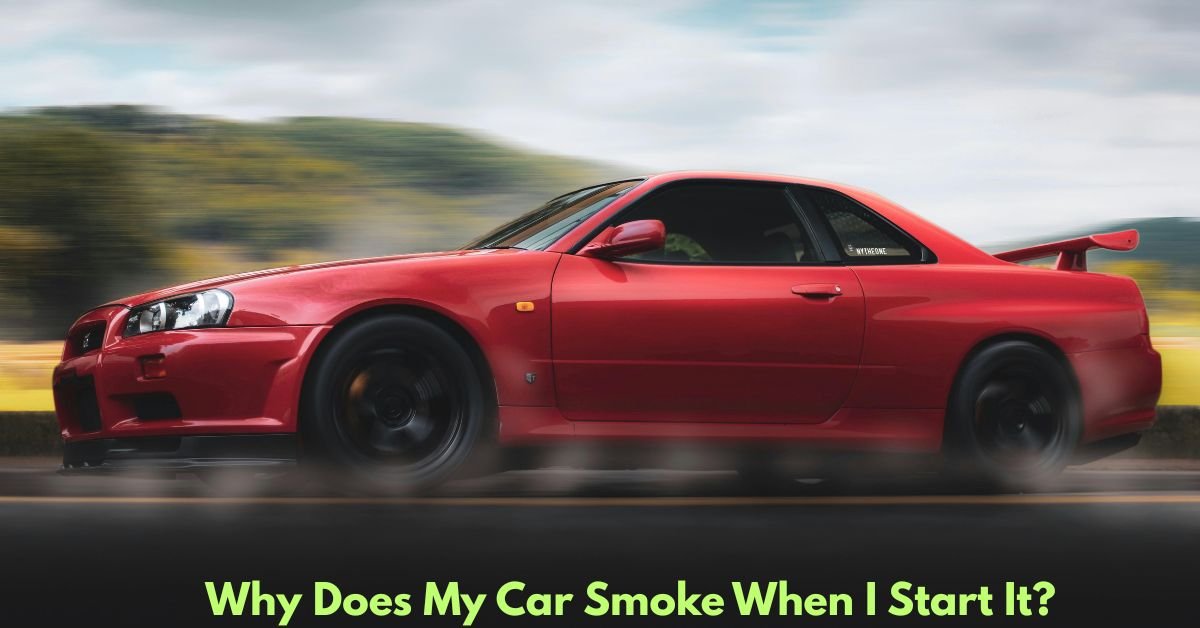Have you ever started your car, only to be greeted by a puff of smoke coming from the exhaust or under the hood? It can be alarming, and you’re probably wondering whether it’s something serious or just a minor issue. While it’s common to see a small amount of smoke under certain conditions, it’s essential to understand the different reasons why your car may be smoking when you start it and how to address the problem.
In this post, we’ll explore the possible causes behind your car smoking and what you can do to fix it.
Why Does My Car Smoke When I Start It?
1. Condensation in the Exhaust System
One of the most common reasons for smoke when starting a car, particularly in cold weather, is simply condensation. When the engine and exhaust system are cold, moisture can accumulate. When you start the car, this moisture heats up and turns into steam, which exits the exhaust pipe. This steam often appears white and will dissipate shortly after the engine reaches normal operating temperature.
If the white smoke disappears after a few minutes, it’s most likely just condensation. However, if the white smoke continues to appear for an extended period or intensifies, you may be dealing with a more serious issue (more on that later).
2. Oil Leaking Into the Combustion Chamber
If you notice blue or gray smoke coming from the exhaust when starting your car, it could indicate that oil is leaking into the combustion chamber. This issue can be caused by worn valve seals, piston rings, or cylinder walls. When the oil leaks into these areas, it burns along with the fuel, producing blue smoke.
Over time, this problem can lead to more significant engine damage. If you suspect that oil is leaking into the combustion chamber, it’s essential to have your car inspected by a mechanic as soon as possible. Continued driving with this issue can result in low oil levels and even engine failure.
3. Coolant Leaking Into the Engine
White smoke can also be a sign that coolant is leaking into the engine. This happens when there’s a problem with the head gasket, cylinder head, or engine block. These components are responsible for keeping the coolant and oil separate, and when they fail, coolant can mix with the engine oil or enter the combustion chamber.
If you notice white smoke coming from the exhaust and it doesn’t go away after the engine warms up, it’s a strong indication that coolant is leaking into the engine. In this case, you may also notice that your coolant level is dropping or that there’s a sweet odor coming from the exhaust. A blown head gasket or cracked engine block are serious issues that require immediate attention, as they can cause extensive damage to your engine.
Must Read: What Will Cause A Car To Overheat?

4. Fuel Injectors or Carburetor Problems
In some cases, excessive fuel being injected into the engine can cause smoke. If the fuel injectors or carburetor aren’t working properly, they may deliver too much fuel to the engine. This results in incomplete combustion, which can produce black smoke. Black smoke indicates that your engine is burning more fuel than it should, which could be due to clogged or malfunctioning fuel injectors, a faulty carburetor, or issues with the air intake system.
While black smoke can be concerning, it’s generally less serious than white or blue smoke. However, it’s still important to address the problem, as it can lead to poor fuel efficiency and engine damage over time.
5. Excessive Carbon Build-Up
Over time, carbon can build up in the engine, particularly around the exhaust valves and piston rings. This build-up can cause incomplete combustion, resulting in smoke when you start your car. If you’re noticing smoke frequently, it may be worth having your engine cleaned or carbon deposits removed.
Using fuel additives designed to clean the engine or performing regular maintenance, such as oil changes and air filter replacements, can help prevent excessive carbon build-up.
What Should You Do?
If you notice smoke coming from your car when you start it, it’s essential to assess the color and behavior of the smoke:
- White Smoke (disappears quickly): Likely just condensation; no action needed.
- White Smoke (persists or increases): Possible coolant leak; visit a mechanic.
- Blue or Gray Smoke: Likely oil burning; check for worn seals or rings, and consult a mechanic.
- Black Smoke: Possible fuel injection or carburetor issue; inspect fuel system.
In general, if the smoke is persistent or you notice any other signs of engine trouble, such as strange noises, overheating, or a drop in performance, it’s best to take your car to a trusted mechanic. Ignoring smoke-related problems can lead to more severe damage to your engine and potentially expensive repairs.
Conclusion
A car that smokes when started isn’t always a sign of impending doom, but it shouldn’t be ignored. Whether it’s just condensation or a more serious issue like oil or coolant leaks, identifying the cause of the smoke early can save you from costly repairs and prevent further damage to your engine. By keeping an eye on the color and duration of the smoke and addressing any concerns promptly, you can ensure your car remains in good working condition for years to come.
